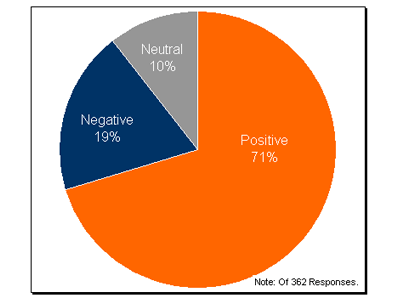|
|
| Figure 1: General Sentiments Towards Reality, Awards Genres |
 |
No slouch itself in the audience-aggregation business for the purpose of selling ads, this new concept puts News in the unique place of doing nothing more than allowing visitors to its websites continue to put fresh content on its servers (no cost of editorial), while simultaneously not needing to invest in its adsales machine (no cost of publishing), and still make huge gobs of cash. A brilliant lesson in managing user-generated content businesses.
Long before the phrase "user-generated content" was coined, other formats have all slowly and evidently pushed audiences - inexorably trained by competition to be tuned into 24-hour media cycles - to actually be engrossed 24 hours a day not just on their terms, but on a level of involvement that can no longer be packaged in the same way to make money. Examples of these formats include sports programming that featured everyone's hometown hero; news with live reporters interviewing spotlight-craving bystanders; game shows that allow audiences to play along; awards shows with unexpected and sometimes unscripted occurrences; of course, reality shows that pushed so far as to become unrealistic; and now interactive competitions where audiences can vote for their favorite entertainers
Indeed, in a recent analysis of a 11-week online marketing campaign for a cable network, we discovered 71% of responders had positive sentiments towards reality and awards genres (Figure 1) because of a friendly brand and friendlier characters (together accounting for over 72% of the reasons for these positive sentiments). Conversely, a majority of 23% claimed they didn't like these genres because of the characters' performances or acting.
Make no mistake, the business
of creating-content-to-draw-an-audience has changed. Nielsen recently announced
that Americans spend over 8 hours every day watching television, (likely thanks
to cheap production of their own videos and the convenience of TiVo
and iPods). (![]() 1)
Newspapers are discovering that their content must be all inclusive online,
inclusive of video and feedback features, in order to build their brands and
make them valuable to advertisers. (
1)
Newspapers are discovering that their content must be all inclusive online,
inclusive of video and feedback features, in order to build their brands and
make them valuable to advertisers. (![]() 2).
And if you're looking for investor cash to start a media business, you are virtually
guaranteed the money as long as you play up your web plan's intentions to use
free interns to solicit free content - bad credit, no problem.
2).
And if you're looking for investor cash to start a media business, you are virtually
guaranteed the money as long as you play up your web plan's intentions to use
free interns to solicit free content - bad credit, no problem.
As a business, media has been so preoccupied with creative and distribution, that they've overlooked that creativity is subjective and the cost of distribution diminishing. And this trend will continue, not abate, as technology decreases in price, broadband gets broader, and production know-how becomes as common as using the phone, all trends that have been reliably predicted and are on schedule to occur. Media companies will wake up one day to realize that everyone had something to say to the world, and indeed, they're saying it, breaking all the established rules along the way. (Consider Tila Tequila, the MySpace girl; Korey Rowe, the "Loose Change" boy; or Google, the current "it" company, all of which achieved powerful voices and huge audiences on their terms without the support of big media.)
Understand that the fascination
with user-generated content isn't just the opportunity to see something new,
something different, or something unexpected, but also something that sticks
to cultural precedent of fighting hard against the big guy. We can agree that
the invention of Napster
turned on this switch of consumers to their newfound power, and like any underdog
fighting a fight they believe just for no other reason than it's against a bigger
and stronger opponent, it's nearly impossible to take that power away.
(1) Nielsen Media Research Reports Television's Popularity Is Still Growing
(2) Who killed the newspaper?, from the August 24th, Economist magazine
|
|